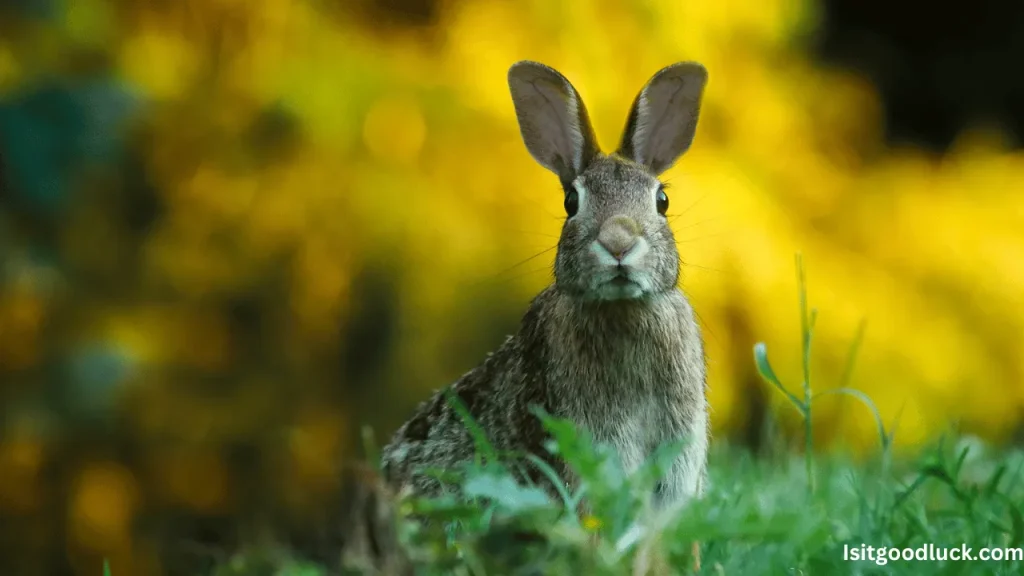Ah, the humble rabbit. With their twitching noses, fluffy tails, and charming hops, rabbits have earned their spot as one of the most adored animals globally.
But beyond their adorable exterior lies a tapestry of beliefs, tales, and superstitions. One pressing question remains: Is it genuinely good luck to spot one?
Contents
- 1 Rabbits in Different Cultures:
- 2 Is it Good Luck to See a Rabbit?
- 3 The Science of Luck:
- 4 How to Make the Most of Your Rabbit Sighting:
- 5 Conclusion
- 6 FAQs
- 6.1 Why is the rabbit considered a symbol of good luck?
- 6.2 Are there specific rabbit colors considered luckier than others?
- 6.3 Do different cultures have varying beliefs about the luck of seeing a rabbit?
- 6.4 Apart from luck, what other symbolism is attached to rabbits?
- 6.5 Does the time of day you see a rabbit influence its lucky charm?
Rabbits in Different Cultures:
In the vast tapestry of Chinese culture, the rabbit is more than just another animal; it’s an emblem of several favorable traits. Enshrined in the Chinese zodiac, the rabbit is an indicator of one’s birth year and a symbol of gentleness, fertility, and a long life.
On the other side of the world, in the verdant lands of Celtic mythology, rabbits and hares are closely associated with the revered goddess Brigid. This deity, known for her fertility, poetry, and healing powers, casts the rabbit in a light of positivity.
Crossing to Native American cultures, the narrative takes a playful twist. The rabbit might be a trickster, but it also embodies good fortune. The Cherokee, for instance, regard a white rabbit sighting as an omen of blessings to come.
But not every culture regards our furry friends as bearers of good tidings. A black rabbit’s appearance in certain European regions is a harbinger of misfortune. Furthermore, in some African traditions, rabbits are linked with darker elements like death and witchcraft.
Also read: Is it Good Luck to See a Coyote?

Is it Good Luck to See a Rabbit?
Rabbits: those fluffy, hop-happy creatures with the cutest twitchy noses! Aside from their charm, there’s an age-old belief that seeing a rabbit is a sign of good luck.
But why? Well, across many cultures, rabbits have been symbols of positivity. In Chinese traditions, for example, the rabbit represents longevity and fertility.
Meanwhile, Celtic lore links them to the goddess of fertility and healing. On the other hand, some folks associate them with bad luck, especially if the rabbit is a particular color, like black in some European beliefs.
So, does spotting a rabbit mean good fortune is coming? That’s a matter of personal opinion and cultural upbringing. But one thing’s sure: seeing a rabbit can make your day brighter!
The Science of Luck:
The very concept of luck is abstract, elusive, and deeply personal. Hence, quantifying or subjecting it to rigorous scientific scrutiny can be challenging. However, studies have shown that mere belief in luck can shape our behaviors and outlook.
For instance, people who harbor a strong belief in luck are more risk-taking and proactive in chasing their dreams. Moreover, they are resilient, returning with vigor from failures or setbacks.
So, while the sight of a rabbit might not instantly change your fate, the optimism it sparks might nudge you toward a path of positivity.
Also read: Is it Good Luck to See a Groundhog?

How to Make the Most of Your Rabbit Sighting:
Witnessing a rabbit can be a fleeting yet magical moment. To truly cherish this serendipitous event, consider these:
- Tune Into Your Emotions: How does the rabbit’s presence make you feel? An overwhelming sense of joy, tranquility, or exhilaration can all be indicators of the positive vibes associated with the sighting.
- Reflect on the Rabbit’s Symbolism: What does the rabbit signify to you? Fertility? Prosperity? Joy? Harness these associations to channel the rabbit’s positive energies into your life.
- Whisper a Wish: As the rabbit hops away, whisper a cherished wish. As the age-old adage goes, “It’s worth a shot!” Who knows? The universe might just be listening.
Conclusion
Whether spotting a rabbit brings luck isn’t one with a definitive answer—it’s nestled in personal beliefs, cultural tales, and individual experiences.
However, the universal truth is that rabbits evoke a sense of wonder with their rich history and cultural significance.
So, pause the next time you’re fortunate enough to encounter one. Savor the moment, embrace the hope it brings, and let yourself be swept away in its magic. Because in that brief moment, whether or not the rabbit brings tangible luck, it brings joy.
Also read other articles regarding animals good luck.
FAQs
Why is the rabbit considered a symbol of good luck?
The association of rabbits with good luck stems from various ancient beliefs and cultural traditions. Their prolific breeding patterns made them symbols of fertility. Also, due to their burrowing nature, rabbits are closely connected to the earth and the cycles of life, reinforcing their symbolism as creatures bringing forth abundance and prosperity.
Are there specific rabbit colors considered luckier than others?
Yes, in some cultures, the color of the rabbit can influence its perceived luckiness. For instance, a white rabbit is considered an auspicious sign in Cherokee beliefs. However, in some European traditions, seeing a black rabbit might be unlucky.
Do different cultures have varying beliefs about the luck of seeing a rabbit?
Absolutely. While many cultures view rabbits as lucky due to associations with fertility and abundance, others might see them differently. For instance, some African traditions link rabbits with more ominous symbols like death or witchcraft, which contrasts sharply with the positive vibes many cultures attach to these creatures.
Apart from luck, what other symbolism is attached to rabbits?
Rabbits have rich symbolic meanings beyond just luck. They’re commonly associated with rebirth, given their connection to the earth and the lunar cycle (think of the “moon rabbit” in various mythologies). They’re also symbols of innocence, vulnerability, and gentleness.
Does the time of day you see a rabbit influence its lucky charm?
While most beliefs don’t specify a time of day, some superstitions do. For example, an old British assumption says seeing a rabbit, especially first thing in the morning, can bring good luck for the rest of the day. On the flip side, in some tales, seeing a rabbit late at night, especially a white one, might be interpreted as an omen or a supernatural sign.








